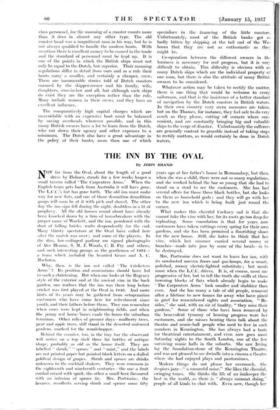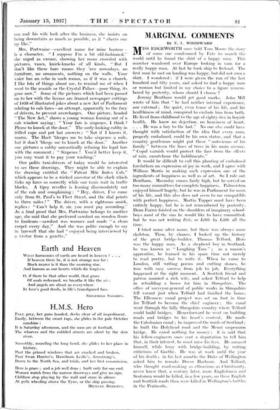THE INN BY THE OVAL
By JOHN SHAND
NOT far from the Oval, about the length of a good drive by Holmes, stands for a few weeks longer a small tavern called ' The Carpenters Arms.' When the English team gets back from Australia it will have gone. The L.C.C.'s fiat has gone forth. The old inn must make way for new flats, and one of those demnition demolition gangs will soon be at it with pick and shovel. The other day the inn-sign fell during the night, doubtless in a lit of prophecy. All the old houses round about have already been knocked down by a firm of housebreakers with the proper name of Waekctt, and the inn, powdered with the (lust of falling bricks, waits despondently for the end. Many thirsty spectators at the Oval have called here after the match was over ; and some of the players. In the dim, low-ceilinged parlour arc signed photographs of Alec Hearne, S. M. J. Woods, C. B. Fry and others, und such interesting groups as the gentlemen of 1891-, a team which included the bearded Grace and A. C. Maclaren.
Why. then, is the inn not called ` The Cricketers Arms ' Y. Its position and associations should have led .to such a christening. But when one looks at the Regency :style of the exterior and at the ancient vine in the back garden, one realises that the inn was there long before cricket was first played at the Oval in 1846. And more hint, of its years may he gathered from octogenarian customers who have come here for refreshment since youth, and their Whets before them. They can remember when cows were kept in neighbouring lields, and when the penny red horse-'buses made the house the suburban terminus. Other relics of greener days—mulberry trees, pear and apple trees, still stand in the deserted unfenced gardens, marked for the woodchopper..
Behind the counter, too, in the tiny bar the observant will notice on a top shelf three fat bottles 'of antique shape, probably as old as the house itself. They-arc labelled " shrub," " spruce " and " and the labels are not printed paper but painted black letters on a dulled gohlleal design of grapes. Shrub and spruce are drinks unknown to the cocktail shakers. They were common in the eighteenth and nineteenth. centuries—the one a fruit cordial mixed with spirit, the other a small beer flavoured with an infusion of spruce fir. Mrs. Portwaine, the licensee, recollects serving shrub and spruce some fifty years ago at her father's house in Bermondsey, but then, when she was a child, there were not so many regulations, and she worked behind the bar so young that she had to stand on a stool to see the customers. She has had several offers for those three black bottles, but she looks on them as household gods ; and they will go with her to the new iim which is being built just round the corner.
What makes this cheerful Cockney sad is that she 'cannot take the vine with her; for its roots go too deep for 'replanting. Some consolation is that for years now 'customers have taken cuttings every spring for their own gardens, and she has been proMised a flourishing. shoot for the new house. Still, she hates to think that her vine, which last summer carried several scores of bunches—made into jam- by some of the locals—is to be destroyed.
Mrs. Portwaine does not want .to' leave her inn, with its sawdusted uneven floors and gas-lamps, for a smart, polished, roomy electric-lighted substitute.; but needs must when the L.C.C. drives. It is, of course, most un- progressive of her, but to tell the truth she sniffs at these towering blocks of flats which already begin to make ` The Carpenters Arms ' look smaller and shabbier than ever. And she has many a tale of old people, removed after a lifetime to new homes far away who have pined in grief for remembered sights and association. " Be- sides," she said, with an air of finality, " they miss their gardens." Some of those who have been removed by the benevolent tyranny of housing progress. were her customers, and she misses hearing them talk about the theatre and music-hall people who used to live in such numbers in Kennington. She has always had a taste for theatrical entertainment, and even now goes most Saturday nights to the South London, one of the, few surviving Music halls in the suburbS. She saw ',Irving lay the foundation-stone of the Kennington Theatre, and was not pleased to see dwindle into a cinema a theatre where she had enjoyed plays and pantomimes.
Modern things do not please her overmuch. She despises jazz—Y` a Mournful noise." She likes the Cheerful, . swinging times.. She thinks the fife of, an innkeeper, the best in the world., as Ahere is." alWays summat doing," people of all kinds to chat with. Even now, though her
son and his wife look after the business, she insists on being downstairs as much as possible, as it " cheers one up like." - - - Mrs. Port.waine—excellent name for mine hostess— is a character. " I suppose I'm a bit old-fashioned," she urged as excuse; showing her room crowded with pictures, vases, knick-knacks of all kinds. " But I don't like these bate' rooms they 'ave nowadays, no furniture, no ornaments, nothing on the walls. Your voice has an echo in such rooms, as if it was a church. I like lots of things about me, to remind me of when I went to the seaside or the Crystal Palace—poor thing, its gone now." Some of the pictures which had been passed on to her with the licence are framed newspaper cuttings of 1853 of illustrated jokes about a new Act of Parliament relating to cab fares—an attempt, apparently to the fury of drivers, to prevent overcharges. One picture, headed " The New Act," shows a young woman leaning out of a 'cab window saying : " Your fare is sixpence, I think ? Please to knock at the door." The surly-looking cabby in Trilled cape and pot hat answers : " Not if I knows it, maim. The Hact 'bleeges Me to take sixpence -a mile, but it don't 'bleege me to knock at the door." Another one pictures a cabby sarcastically refusing his legal fare with the comment : " Sixpence ! You'd better keep it, you may want it to pay your washing."
Our polite taxi-drivers of today would be interested to see these drawings. They might be able to explain the drawing entitled the " Patent Mile Index Cab," which appears to be a wicked ancestor of the clock which ticks up fares so correctly while our taxis wait in traffic blocks. A tipsy reveller is leaning disconsolately out of the cab and complaining : " Hey, driver, I've come only from St. Paul's to Fleet Street., and the dial points to three miles ! " The driver, with a righteous smirk, replies : " Can't help it, sir, you must pay according." As a final proof that. Mrs. Portwaine belongs to another age, she said that she preferred sawdust on wooden floors to linoleum—sawdust was warmer and made " a clean carpet every day." And she was polite enough to say in farewell that she had " enjoyed being interviewed by a visitor from a gazette."











































 Previous page
Previous page